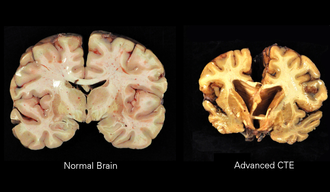Chronic traumatic encephalopathy
(Redirected from CTE)
Jump to navigation
Jump to search
Chronic traumatic encephalopathy, abbreviated CTE, is a neurodegenerative disease due to repeated trauma.
The in the context of boxing it is known as dementia pugilistica; pugil is boxer in Latin.[1]
General
- Due to head trauma - usually repetitive.
- Seen in American football and boxing.
- May be associated with motor neuron disease.[2]
Microscopic
Features:[3]
- Wall-to-wall neurofibrillary tangles.
- Common in olfactory bulb, mammillary bodies, hippocampus.
- Usually perivascular around small blood vessels.
- Often superficial (unlike Alzheimer disease) and at the deep aspect of sulci.
- But not restricted to superficial regions of sulci (also deep in parenchyma).
- Staging according to Bienik et al.: NFT in <5 regions: low CTE, in 5 or more: high CTE.[4]
IHC
- Increased TDP-43 staining.
- p-Tau neuronal aggregates.
- +/. thron shaped-astrocytes.
- Usu. absence of beta-amyloid.
Note:
See also
References
- ↑ URL: http://dictionary.reference.com/browse/pugilism. Accessed on: 21 November 2011.
- ↑ Daneshvar, DH.; Riley, DO.; Nowinski, CJ.; McKee, AC.; Stern, RA.; Cantu, RC. (Nov 2011). "Long-term consequences: effects on normal development profile after concussion.". Phys Med Rehabil Clin N Am 22 (4): 683-700. doi:10.1016/j.pmr.2011.08.009. PMID 22050943.
- ↑ Stern, RA.; Riley, DO.; Daneshvar, DH.; Nowinski, CJ.; Cantu, RC.; McKee, AC. (Oct 2011). "Long-term Consequences of Repetitive Brain Trauma: Chronic Traumatic Encephalopathy.". PM R 3 (10 Suppl 2): S460-7. doi:10.1016/j.pmrj.2011.08.008. PMID 22035690.
- ↑ "Intrauterine growth retardation and fetal transverse cerebellar diameter". Prenat Diagn 14 (12): 1101–5. December 1994. doi:10.1002/pd.1970141202. PMID 7899277.
- ↑ Costanza, A.; Weber, K.; Gandy, S.; Bouras, C.; Hof, PR.; Giannakopoulos, P.; Canuto, A. (Oct 2011). "Review: Contact sport-related chronic traumatic encephalopathy in the elderly: clinical expression and structural substrates.". Neuropathol Appl Neurobiol 37 (6): 570-84. doi:10.1111/j.1365-2990.2011.01186.x. PMID 21696410.
